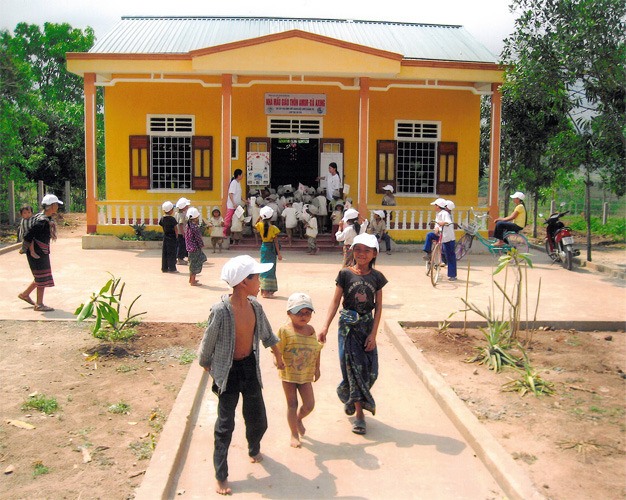Islander David Warner died more than 40 years ago in Vietnam, one of more than 58,000 Americans who died during the grueling war in the jungles of Southeast Asia that consumed most of the 1960s. He was killed by gunfire on Feb. 17, 1968, on the porch of a house in the middle of Hue City during a days-long battle called the Tet Offensive, one of the seminal events of war in Vietnam.
Warner had been in Vietnam for just eight months when he was killed. He was one month shy of his 22nd birthday. He was survived by his parents and two sisters, Marci and Sue, then just 7 years old.
He had volunteered for duty in Vietnam.
He was just the type of young man who was sent off by the hundreds to the jungles of Southeast Asia, never to return.

Warner, a Marine, was born on March 22, 1946. He graduated from Mercer Island High School in 1964. He attended Central Washington University for a semester, came home and worked at various jobs, including a stint where his dad worked and at Seaborne’s Marina in Leschi.
The Warner family had moved to the Island in the 1950s, where they lived near the high school.
“From what I hear, it was ‘kid-haven,’” Warner’s youngest sister Sue Warner-Bean said. “Dave and his friends had a wonderful time playing in the ravine behind the house along Gallagher Hill Road.”
An Eagle Scout, the athletic and fit Warner enlisted in the Marine Corps in 1966. After boot camp he spent about a year in Hawaii, then — as he had hoped — was sent to Vietnam in August 1967. The bad news came to the family home just a few months later.
Warner-Bean, then a first-grader, remembers the day well. It was a weekday afternoon. Her father was at work. She remembers the knock and the soldiers at the door. Just hours before, a letter had arrived from her brother. Her mother waited to tell her father the news until after he read the letter when he returned home from work. That evening, Warner-Bean thought that she did not remember her brother’s face. She recalled going from room to room looking for pictures.
Years later, Warner-Bean, now an emergency management consultant specializing in aviation, does not remember a lot of outward grieving by the family.
“We were fairly stoic,” shesaid. “But we were devastated.”
Just a couple of years later, her mother boxed up what she had of David’s things, taped it shut and stored it away. But as her father began to be quite ill with Alzheimer’s disease more than 30 years later, he began asking for his son.
Warner-Bean’s own search for her brother did not begin in earnest until 2003.
Warner-Bean’s husband Jeff Bean, an attorney and mediator, suggested that they order Dave’s military records and find out more, she said.
“I’d always been curious, but it had felt like a taboo topic,” she said.
A manila envelope appeared in her mailbox on Memorial Day weekend, 2003, and a journey began.
“I still remember reading and re-reading the records and being struck by the details I’d never known; things as simple as Dave’s height, his weight, and the color of his eyes.”
She found that her brother was a member of Golf Company, 2nd Battalion, 5th Marines — G2/5. a key clue to finding out more.
Through her painstaking research and by happy accident, she has learned a good deal more about her brother through people she has met and sources of information she has discovered. She calls these bits of information “threads.”
“As I have chased these threads over the years, I have come to know that my brother was more than just my hero,” she said.
She found her brother’s former commanding officer, retired Marine Col. Chuck Meadows, in May 2004. He happens to live on Bainbridge Island, and at the time was the executive director of PeaceTrees Vietnam.
Warner-Bean, became involved in PeaceTrees and their efforts to clear Vietnam of land mines, plant trees lost to Agent Orange and establish schools and libraries for children. She found herself traveling to Vietnam to help. She wanted to bring something positive out of her brother’s life and her family’s loss. With the help of others, she established a kindergarten and named it after her brother.
After Warner-Bean’s first visit to Vietnam 2005, her mother re-opened the box of Dave’s mementos and personal effects and found solace in a photo of Dave and a buddy in Vietnam. They had tracked down the friend named Doug Blayney. He wrote to the family.
“My mother learned that he was not alone and not afraid.
“I know it brought her a lot of peace.”
She explains how many are drawn to going beyond their grief when they visit Vietnam to see where a loved one fought and died.
People who are on their own mission revisit the scene of their own losses that have haunted them throughout their lives, she explained. But they also come to leave something positive behind.
Throughout her journey of the past decade, she marvels at the direction that her life has taken. Her brother is her link and entree to others whom she never would have met, and to establishing a school in his name.
“This is not what I had envisioned for my life,” she laughs. “It is all because of Dave.”
For more, go to www.peacetreesvietnam.org.


